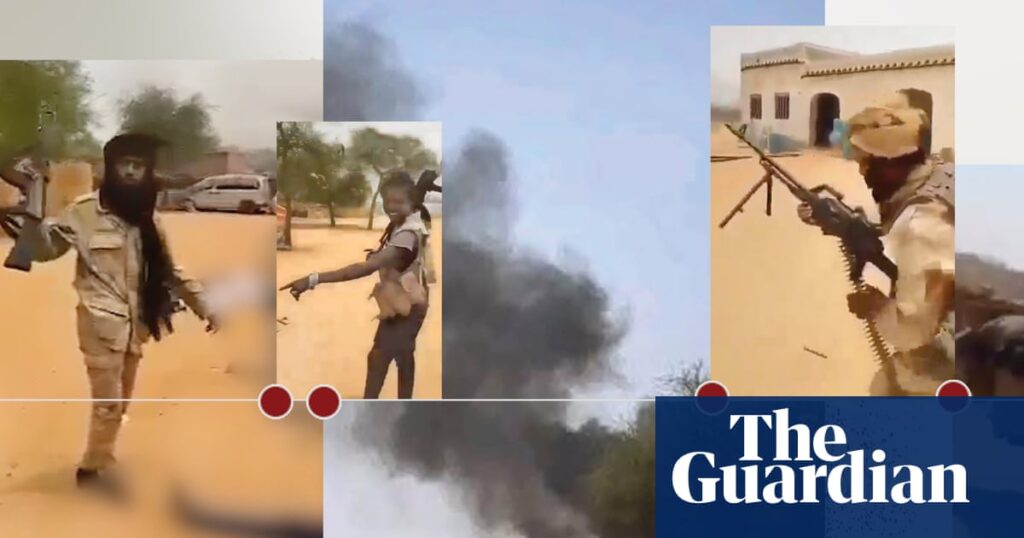In Sudan, the RSF continued to push deeper into Zamzam. House to house searches were carried out. Occupants were summarily executed. Tayseer Abdalla saw two of her aunts and their young daughters killed inside their home near the central market.
Mariam watched the militia enter her sister’s house. “They dragged her out and killed her. They slaughtered us like animals,” she says.
Ruqayyah and her family were leaving when the RSF entered their home. Wordlessly, they opened fire. Ruqayyah was able to limp away. Three others were left to die.
Meanwhile, across south Zamzam, RSF fighters offered bribes for clues to Hanadi’s whereabouts. “They were offering huge amounts,” says Ismail Idris, a relative who lives in the British town of Reading.
Kaltouma, another camp resident, describes the fighters arriving at her door. “They were shouting: ‘Where is she? Where is she?’”
For all the efforts to locate her, Hanadi was often directly in front of them. “She was present on the frontlines, treating, bandaging,” says friend Mohamed Afandy.
The casualties mounted. Defended by a ragtag mix of volunteer resistance units and joint forces – whose remit was to protect civilians – the camp was hopelessly outgunned and outnumbered.
About 200 RSF pickups had attacked Zamzam, seven times the number defending it. By midday, the RSF had crossed the B26 highway, entering the main camp.
A call had gone out for civilians to defend Zamzam. “Hanadi was among the first to answer,” says Muhammad Effendi, a resident.
Hanadi headed to the frontline armed with a modest kitchen knife. Up against hi-tech drones and guided bombs, Hanadi’s father, Juma, says her unit repelled at least one attack.
By early afternoon, Hanadi’s unit was pinned down near the central market. Witnesses describe the nurse laying down her knife to tend to the wounded.
Mohammed Sharif, 27, ran past her position under ferocious fire. “I saw her saving injured people, giving them medicine.”
Hope rested with a sizeable Sudanese military garrison seven miles away in El Fasher. If soldiers were sent, Zamzam would be saved.
“We were waiting for support from El Fasher but didn’t get it. We still don’t know why,” says Mohamed Adam, a teacher.
The central market was not the only place under pressure. Mustafa Bora saw RSF fighters heading for the camp’s community kitchen.
Bora sprinted there, imploring everyone to evacuate. Hasanat Musa – seven months pregnant – and her friend, Nana Idris, refused to budge.
“Why are you cooking for slaves?” asked fighters as they stormed the kitchen, smashing pots. Musa’s late-stage pregnancy offered no protection. She and Idris were executed.
The attackers closed in on Hanadi’s new position: a makeshift health centre north of the market. Hisham Mohamed was fighting alongside her. “She told us: ‘Die with honour. I will be here until the end.’”
Hanadi may not have noticed the men approaching. Only when alongside her did they reveal their weapons. She was shot at close range.
“Their operatives infiltrated the camp disguised in civilian clothing to carry out her assassination,” says Juma.
Chaotic footage shows her being carried by friends to another rudimentary clinic. A soundtrack of gunfire is constant.
By now, much of Zamzam was hurrying north. Shells fell on fleeing families. RSF snipers climbed trees, picking them off.
Mariam witnessed children flattened by a shell as they fled. “Nobody will ever bury them,” she says.
Others described leaping over body parts. Bleeding children lay waiting for help that never came.
Hundreds hid underground in cramped, sweltering foxholes. “They were quickly filled with women and children,” says one witness, Adouma Ali.
RSF death squads combed the area. Anyone found in a foxhole was shot.
Further south, Bakhit lay frozen beside her dead husband and child. At 3pm a neighbour attempted to reach her but was shot in the hip.
6.30pm
Darkness fell. The RSF retreated. “Suddenly it was quiet. People emerged from foxholes, shellshocked,” says Ali. As the cacophony of gunfire subsided, children could be heard crying in the dark.
Next, the scraping of shovels as bodies were placed in shallow graves. Bakhit laid her five-year-old son and husband in an enlarged foxhole.
In Zamzam’s southern neighbourhoods, the night brought terror. Fighters wandered devastated streets, looking for women to abduct. In Hamaday and Karaba districts, they began raping.
Elsewhere, residents headed towards Saloma, Zamzam’s northern neighbourhood. Many passed the makeshift clinic where volunteers were battling to save Hanadi.
Back in London, as night fell, the mood among humanitarians was febrile. Attempts to cajole FCDO officials into making a statement on Zamzam ahead of the conference had foundered. “Everybody was raging, asking: ‘Where’s Lammy?’” recalls a prominent human rights expert.
They could not even pressure Sudanese diplomats attending the conference: none had been invited.
Details of the atrocities, delivered to western policymakers, were politely dismissed.
“Evidence of genocide was met with: ‘Thank you for sharing. Keep us updated,’” says a prominent humanitarian.
Although the UK is “penholder” on Sudan – meaning it leads the UN security council’s activities on Africa’s third-largest country – nothing happened.
Many felt the timing of the offensive before the conference was deliberate. “It was beyond provocative. The RSF – and its alleged backers, the UAE – were saying: “Go on, let’s see what you can do,” says the UN investigator.

